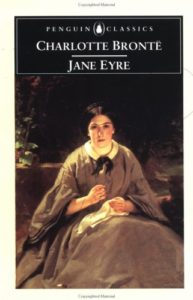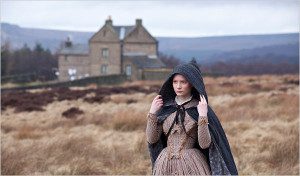
** spoiler alert ** If you haven’t read it and think you might, don’t read this review! This truly great book is filled with suspense and surprises.
I rarely read a book more than once, but Jane Eyre by Charlotte Bronte has captured my attention repeatedly since I first encountered it years ago.
The book jacket claims that “Charlotte Bronte poured her contempt for the stifling conventions society imposed upon a woman’s right to emotional and sexual fulfillment.”
On one hand, I can see how this “frank revelation of female character” may have been shocking or particularly well-developed for the time. The romantic male characters in Bronte novels are far from ideal or societally acceptable in the classic sense.
In actuality, this novel is far from a feminist treatise, unless one defines feminism as upholding Christian chastity in the spirit of Proverbs 31 and Matthew 5:30.
In this novel, Edward Rochester is the desire of Jane Eyre. He is an ugly, older man with a bombastic character and a whole lot of baggage. In fact, he has a psychotic wife locked up in his house, a secret he has kept from almost everyone, even Jane. Yet, they fall deeply in love; a love which is well-developed in the story and quite pleasant to read.
Finally, he asks her to marry him and, with their vows imminent, someone speaks up during the ceremony to oppose the match. The truth comes out about the wife and, in spite of her intense feelings of affection for him, Jane makes the decision to leave Edward completely. He is exceedingly repentant, and by the time you hear his story, you don’t feel nearly as bad for him as you want to. But she runs away and does not look back. The reader sees her deep love and her compassion for him and his situation but also sees that there is a finality about her actions; a refreshing sense of totality in her willingness to abandon her desires for the sake of her conscience and her knowledge of the Ten Commandments.
All seems lost, and I assumed Jane was going to end up with an austere, brilliant, and handsome missionary and minister who proposes to her and invites her to go to India with him.
She can’t leave, however, until she resolves once and for all to learn what has happened to her true love. Is this regret or remorse for turning away? The reader senses it is purely love. It turns out Edward’s house has been burned down by the disturbed wife who died in the fire. He has been blinded and left even uglier than before, and now that she is free to marry him, they marry and live a contented life together.
How this book can be touted as a feminist masterpiece in the modern-day, cultural sense of the word is beyond me. I found it to be an incredible spiritual treatise, and Jane and Edward’s spiritual journeys are palpable and poignant.
When Jane leaves Edward, refusing to give in to the temptation of living with a married man, she trusts God entirely to care for her. Where she ends up is ultimately prosperous, both materially and emotionally. She gets reconnected with family she didn’t know she had, and part of the very communication that led to her initial tragedy of the called-off wedding turns into the very thing that prospers her. When she does meet Edward again, she gives herself wholly to his service. She feels free to love him completely and serve him in his infirmities, which ultimately lessen as he regains some of his vision.
Edward, on the other hand, travels through the fire, getting terribly humbled. Only when he completely gives himself to God does he have a second chance to find happiness, and this time, on the terms of the Christian faith which is the foundation of the story. These characters face extreme trials while staying true to Christian ideals.
The underlying message of this book is that God’s rules are liberating and lead to a very unexpected joy. Not very feminist in the modern-day sense of the word!
If you haven’t read Jane Eyre yet, you should. You may find her, as I have, a strong and fitting companion for the Christian journey.

